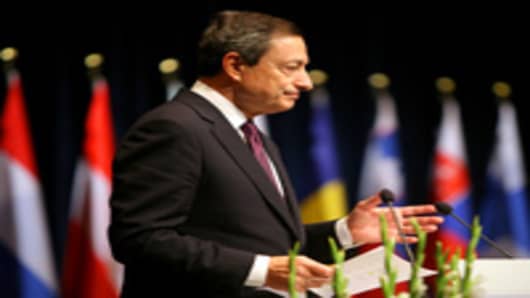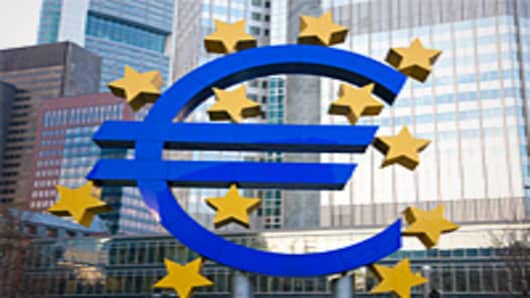The European Central Bank left interest rates on hold on Thursday, as its President Mario Draghi defended its use of ultra-long loans (LTROs) and said they had helped avert another credit crunch.
The ECB, holding its first policy meeting of this year, held its benchmark rate at a record low 1 percent, matching the lowest level ever. The decision was in line with market expectations.
ECB President Mario Draghi said at a press conference following the announcement that the decision was unanimous.
He defended the central bank's use of long term refinancing operations (LTROs) to fight the crisis. Critics have said that banks are hoarding liquidity following the LTROs rather than injecting it into the real economy, as the amount of money deposited overnight with the ECB has soared.
"The more time passes since we had the first three-year LTRO, the more we see signs that it has been an effective policy measure," Draghi said. "Since then, we also saw that some unsecured bond markets have reopened. They were completely shut."
Draghi believes that the banks that have borrowed the money from the ECB are not the same that are redepositing money with the central bank's deposit facility.
Financial markets showed little reaction. The euro and benchmark German bund futures both moved up slightly.
Draghi also warned European governments that they need to continue their programs of fiscal consolidation.
Slippages in the implementation of fiscal consolidation plans of vulnerable countries must be corrected swiftly by structural fiscal improvements," he said.
"Euro area governments need to do their utmost to support fiscal sustainability by correcting excessive deficits in accordance with the agreed timetables and by moving to a structural balanced budget or surplus position over the medium term."
The Hungarian government was warned about its recent actions — in particular a controversial new law which the IMF and the European Union say curtails the independence of its central bank.
"We are really very concerned (about Hungary)... the ECB is really very careful about signs of pressure being put on decision-making bodies," Draghi said.
"I think these pressures are inconsistent with the spirit of the (European Union) treaty."
Outlook Reaffirmed
Draghi reiterated the ECB's prediction for a gradual recovery in the euro zone economy in 2012, and its expectations for inflation.
"We continue to expect euro area economic activity to recover, albeit very gradually in the course of 2012, supported by developments in global demand, very low short-term interest rates, and all the measures that we have taken to support the functioning of the financial sector," he said.
He predicted that euro area inflation is likely to stay above 2 percent for several months to come before declining to below 2 percent.
Most analysts expect a cut in interest rates February or March.
"This confirms our expectation that the ECB wants to stay in wait-and-see mode at the moment and digest what the latest data are telling them about the magnitude and depth of the recession in the euro area," said Nomura economist Jens Sondergaard.
The Bank of England announced Thursday that it will keep interest rates on hold and not start any further quantitative easing.
Effectiveness of LTROs
To fight the euro zone crisis, the ECB last month started giving banks LTROs, eased collateral rules and kept buying government bonds - as well as cutting rates for the second time since Draghi took over the presidency on November 1.
Draghi insisted that the LTROs had helped avert another funding crisis in Europe's banking system, which would have had negative consequences across the region.
French President Nicolas Sarkozy wants banks to use the new loans to buy sovereign bonds and strongly bid debt auctions in Spain and Italy on Thursday suggested some may be doing that, with analysts saying abundant liquidity helped support demand.
"The ECB will probably want to assess what to make of the LTRO uptake and whether the balance sheet expansion this LTRO basically implied is feeding into the banking sector and how it is affecting the sovereign debt crisis," said Sondergaard.
Spanish and Italian yields both fell at Thursday's auctions.
"It's too early to say whether this is linked directly to the LTROs but the yield movements should suggest that some of the sovereign debt crisis is abating," Sondergaard added.
At the first chance to get 3-year funds, banks took a record amount in late December, though so far much of the money has returned to the ECB as overnight deposits.
Due to the generous liquidity provision and a bond-buying program, the balance sheet of the ECB and euro zone national central banks has ballooned in the last four months.
Now that the European bail-out fund is becoming operative and has the right to buy bonds, the ECB could spend less.
"Everyone is looking for more clarity on bond-buying, but nothing has changed," ING economist Carsten Brzeski said. "They will continue on this thin line of doing something, but keeping pressure on governments."
The ECB has persistently argued against private sector involvement (PSI), correctly forecasting that it would increase contagion risks. ECB policymaker Athanasios Orphanides last week called for a reversal of PSI.
Draghi said that the ECB governing body believed PSI in Greece was "unique and exceptional" and welcomed this.



